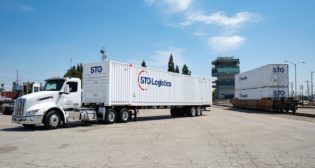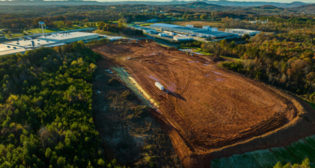
MassDOT Awards $3MM in Industrial Rail Access Grants
Written by Marybeth Luczak, Executive Editor![MassDOT on Sept. 8 tweeted: “Rail and Transit Administrator Slesinger joined @MassLtGov Polito [Lieutenant Governor Karyn Polito] in #NewBedford today to announce 3Mil in Industrial Rail Access (IRAP) Grants. These grants will help boost industrial rail freight access, jobs, and expand rail service.” (Photograph Courtesy of MassDOT via Twitter)](https://www.railwayage.com/wp-content/uploads/2022/09/Screen-Shot-2022-09-09-at-11.17.27-AM.png)
MassDOT on Sept. 8 tweeted: “Rail and Transit Administrator Slesinger joined @MassLtGov Polito [Lieutenant Governor Karyn Polito] in #NewBedford today to announce 3Mil in Industrial Rail Access (IRAP) Grants. These grants will help boost industrial rail freight access, jobs, and expand rail service.” (Photograph Courtesy of MassDOT via Twitter)
The Massachusetts Department of Transportation’s Rail and Transit Division is distributing $3 million to seven industrial rail access projects that will help reduce truck traffic in the state.
The projects will receive grants under the FY 2023 Industrial Rail Access Program (IRAP), a competitive state-funded public/private partnership program that provides financial assistance to freight railroads, rail shippers, municipalities and economic development corporations. IRAP funds cannot be used for state-of-good repair projects or rail maintenance and equipment projects unrelated to establishing freight rail access to current and operational-ready industry partners, according to MassDOT, which noted that use of IRAP funding is prohibited from supporting freight railroad operating costs or industry customer/partners. Additionally, grant recipients must match public grant funds with private funds totaling at least 40% of a project’s total cost.
The FY23 projects were selected, in part, based on the strength of the industry/railroad business commitments and the anticipated public benefits and economic outcomes upon project completion, and project implementation readiness and a planned grant spending completion aligning with the state fiscal year.
And the seven recipients are:
- CSX: A $499,000 grant will support the Everett Coke Works Rehabilitation Project, which MassDOT said “will aid the continued use of freight rail service to shippers in Everett and increase both the reliability and volume of freight rail shipments, eliminating 1,350 truck trips annually.”
- Old Boston Road Recycling: A $500,000 grant will support new track construction at a recycling facility in Wilbraham, which is slated to eliminate 10,000 truck trips annually.
- Arrowhead Environmental Partners: A $500,000 grant will go toward renovations of the company’s Ayer, Mass., yard, which are expected to help eliminate 5,600 truck trips annually and create four jobs.
- Cavossa Disposal Corporation: A $413,326 grant will help modernize the Upper Cape Regional Transfer Station in Sandwich. The project will create five jobs and remove 2,000 annual truck trips, MassDOT reported.
- Lehigh Cement Company LLC: A $500,000 grant will be used to upgrade railcar unloading systems in Palmer. The move will not only increase the volume of freight rail shipments, MassDOT said, but also eliminate 925 truck trips annually.
- Broco Energy: A $334,289 grant will support improvements to the 81 Hale Street Yard rail facilities in Haverhill, which are slated to remove 3,200 annual truck trips.
- Ice Cube Maritime: A $361,669 grant will go toward rail and unloading facility upgrades in New Bedford, which will eliminate 400 truck trips annually and create five jobs.
“The IRAP program has been extremely valuable in supporting the needs of rail and freight while creating jobs and enhancing economic growth,” said Massachusetts Lieutenant Governor Karyn Polito, who on Sept. 8 joined MassDOT Rail and Transit Administrator Meredith Slesinger, New Bedford Mayor John Mitchell, Representative Antonio Cabral, and local officials at Ice Cube Cold Storage to announce the latest round of IRAP grant recipients.
“The program supports projects that increase access to freight rail service and preserve or stimulate economic development through the generation of new or expanded rail service,” Transportation Secretary and CEO Jamey Tesler said. “It’s important to note that investing in rail and freight infrastructure helps reduce truck traffic on our roadways, thereby reducing congestion and greenhouse gas emissions.”



